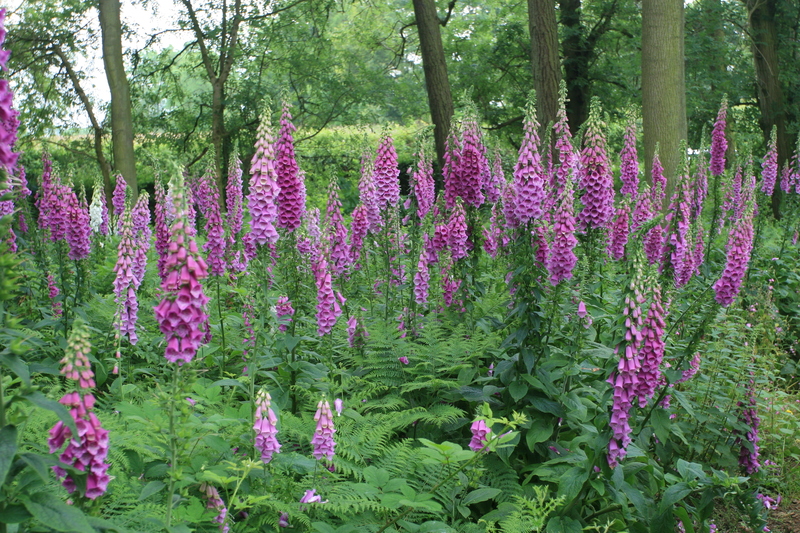Transforming Organic Waste into Soil Fertility
Posted on 09/10/2025
Transforming Organic Waste into Soil Fertility: Unlocking Nature's Power
Organic waste management is a critical global challenge. Transforming organic waste into soil fertility is a process that not only diverts waste from landfills but also enhances the productivity and health of soils. In this comprehensive guide, you will discover how to turn organic waste into a soil enrichment resource, exploring sustainable, eco-friendly practices, and the latest techniques in composting and soil regeneration.

What is Organic Waste?
Organic waste (biodegradable waste) refers to materials of plant or animal origin. These include: food scraps, yard trimmings, paper, coffee grounds, manure, and more. Unlike inorganic waste, organic waste decomposes naturally, making it a valuable asset for improving soil fertility through various recycling and composting techniques.
Types of Organic Waste
- Kitchen scraps (fruit peels, vegetable trimmings, coffee grounds)
- Garden leftovers (grass clippings, leaves, branches)
- Farm manure and livestock bedding
- Paper and cardboard (uncoated and non-waxed)
- Eggshells and nutshells
- Food processing byproducts
Why Transform Organic Waste into Fertile Soil?
Landfills are overflowing, producing harmful greenhouse gases like methane. Transforming organic waste into soil fertility offers environmental, economic, and social benefits:
- Reduces landfill waste and associated pollution
- Conserves natural resources by recycling nutrients
- Improves soil structure and microbial activity
- Supports sustainable agriculture and local food systems
- Cuts down on costs for synthetic fertilizers
- Locks carbon in soils, mitigating climate change
How Does Organic Waste Enhance Soil Fertility?
Composting and related processes return essential nutrients (such as nitrogen, phosphorus, and potassium) to the earth. Here's how the transformation works:
Decomposition and Humification
When organic matter breaks down, microbes and earthworms transform it into humus -- the dark, nutrient-rich component of soil. Humus improves soil's water retention, structure, and aeration. This process also encourages diverse microbial life, which boosts plant health and resistance to diseases.
Enriching Soils with Living Organics
The addition of organic material increases soil fertility by:
- Supplementing nutrients needed for plant growth
- Improving soil pH balance
- Stimulating beneficial soil organisms like bacteria and fungi
- Decreasing soil erosion and compaction
Composting: The Cornerstone of Soil Enrichment
Composting is the most common and effective way to convert organic waste into soil fertility. It's a natural process where micro-organisms break down organic materials in an oxygen-rich environment, yielding a nutrient-dense amendment for gardens and farms.
Basic Components of Composting
- Carbon-rich "browns" (leaves, straw, paper)
- Nitrogen-rich "greens" (kitchen scraps, grass clippings, manure)
- Water (moisture is required for microbial activity)
- Air (oxygen speeds up decomposition, prevents foul odors)
Maintaining the right balance of these components is crucial for efficient composting and producing high-quality compost.
Types of Composting Systems
There's a composting method for every scale and space!
- Backyard Composting: Ideal for households and small gardens
- Vermicomposting: Using earthworms to process organic waste quickly (great for indoor use or small spaces)
- Bokashi Composting: Anaerobic (no-oxygen) method using inoculated bran, suitable for food scraps
- Large-scale or Commercial Composting: For farms, municipalities, and food industries
How to Start Transforming Organic Waste at Home
It's easy and rewarding to create your own soil fertilizer from organic waste. Here's a step-by-step guide:
1. Choose Your Compost Bin or Area
- Purchase a bin or build one from pallets
- Pick a dry, shady spot near a water source
- Ensure your bin has good drainage and air flow
2. Collect Organic Waste
- Separate kitchen scraps and yard waste from trash
- Chop food waste into small pieces for faster decomposition
3. Layer "Greens" and "Browns"
- Alternate nitrogen-rich (wet, green) and carbon-rich (dry, brown) materials
- Maintain a ratio of about 2/3 browns to 1/3 greens
4. Maintain Proper Conditions
- Keep compost damp like a wrung-out sponge
- Turn or aerate the pile every 1-2 weeks
- Add materials regularly and monitor progress
5. Harvest and Use Your Compost
- Compost is ready when it's dark, crumbly, and smells earthy (usually after 2-6 months)
- Scatter compost around plants, mix it into soil, or use as mulch for maximum fertility
Advanced Methods for Organic Waste Transformation
Beyond traditional composting, there are innovative and sustainable techniques to boost soil fertility using organic waste:
Vermicomposting (Worm Composting)
Employs special worms (usually Eisenia fetida) to rapidly break down kitchen scraps. The resulting worm castings are among the richest organic fertilizers, packed with beneficial microbes and nutrients.
Bokashi Fermentation
A Japanese technique that uses microorganisms to pickle organic wastes in airtight containers. Bokashi produces a pre-compost that quickly turns into high-quality soil nutrients once buried.
Biochar
Biochar is charcoal made from biomass. Added to soil, it helps retain nutrients and water, improve microbial habitats, and sequester carbon: a key weapon in climate change mitigation.
Mulching
Laying shredded garden waste, leaves, or straw directly on the soil protects soil, conserves moisture, suppresses weeds, and slowly breaks down into organic matter.
Community and Agricultural Scale Solutions
On a larger scale, transforming organic waste into soil health can revolutionize agriculture and urban waste management:
- Municipal composting programs convert city-wide food and yard waste into community soil amendments
- On-farm composting closes nutrient loops, reducing reliance on costly fertilizers
- Agroforestry and regenerative agriculture integrate organic recycling into sustainable landscapes
- Compost tea and liquid fertilizers made from organic waste supply nutrients to crops in an easily absorbed form
The Science Behind Soil Regeneration
Healthy soil is alive with billions of microorganisms. When we add organic matter from waste, we feed this subterranean life:
- Bacteria and fungi break down complex organics into plant-available nutrients.
- Earthworms aerate the soil and mix in organic residues.
- Microscopic organisms (actinomycetes, protozoa) build disease resistance and nutrient cycling.
This diversity increases soil fertility and plant growth, creating a resilient, thriving ecosystem.
Challenges and Solutions in Organic Waste Transformation
While the benefits are immense, challenges include:
- Contamination: Plastics, chemicals, or non-organic waste can ruin compost quality. Solution: Careful sorting and public education.
- Odors and Pests: Poorly managed compost attracts vermin. Solution: Correct balance and covering food scraps.
- Space Limitations: Urban dwellers may lack backyard space. Solution: Try small-scale or community compost drop-offs.
- Composting Time: Composting takes patience. Solution: Aerate frequently or use rapid composting bins for faster results.
The Global Impact: Organic Waste to Soil Fertility for a Greener Planet
By transforming organic waste into soil fertility at homes, farms, and cities, we:
- Combat land degradation and desertification
- Promote carbon sequestration (climate action!)
- Improve food security and nutrition
- Foster greener, healthier communities
This cycle of regeneration follows nature's example -- nothing goes to waste and everything returns to nourish new life!
Tips for Maximizing Soil Health from Organic Waste
- Use a variety of organic materials for a broad nutrient profile.
- Avoid adding meat, dairy, or greasy foods to most backyard compost. Stick to plant-based waste for best results.
- Test your soil regularly and adjust your compost recipe according to nutrient needs.
- Rotate your compost pile and gardens to spread fertility benefits evenly.
- Combine composting with other techniques, like cover cropping and reduced tillage, for optimal soil fertility.
Innovations and Future Trends in Organic Waste Recycling
Technology is revolutionizing organic waste management. Today, you'll find:
- Smart composting bins with temperature/humidity monitoring for optimal decomposition
- Large-scale anaerobic digesters converting food waste into biogas and fertilizer
- Apps connecting food waste sources to farmers and gardeners seeking organic material

Conclusion: A Brighter Future Through Transformation of Organic Waste
Transforming organic waste into soil fertility offers a sustainable, practical solution to multiple challenges -- from managing household and agricultural waste to restoring degraded soils worldwide. By adopting sustainable organics recycling techniques like composting and mulching, we regenerate the land, capture carbon, and create vibrant, living soils that support abundant plant and human life.
Start your journey today: even the simplest act, such as composting your kitchen scraps, is a step toward a cleaner planet and a more resilient food system. Together, we can turn waste into wealth, and soil into a source of hope and prosperity.
Frequently Asked Questions (FAQs)
-
What is the best way to transform kitchen waste into soil fertilizer?
Answer: Composting is the easiest and most effective. Whether in a backyard pile or a worm bin, regular aeration and proper mixture of greens and browns will yield nutrient-rich compost. -
Can all organic waste be used to increase soil fertility?
Answer: Most plant-based waste is suitable. Avoid fats, meats, and treated woods in regular compost, and always check for harmful chemicals. -
How long does it take to turn organic waste into compost?
Answer: Depending on the method and climate: 2-6 months for most backyard systems, while commercial systems may process waste in just a few weeks.
Ready to join the movement? Transform your organic waste into vibrant, soil fertility and make a difference for yourself and the planet!
Latest Posts
Transforming Organic Waste into Soil Fertility
Beginner's Guide to Thriving Herb Gardens
Designing a Magical Garden for Young Explorers

